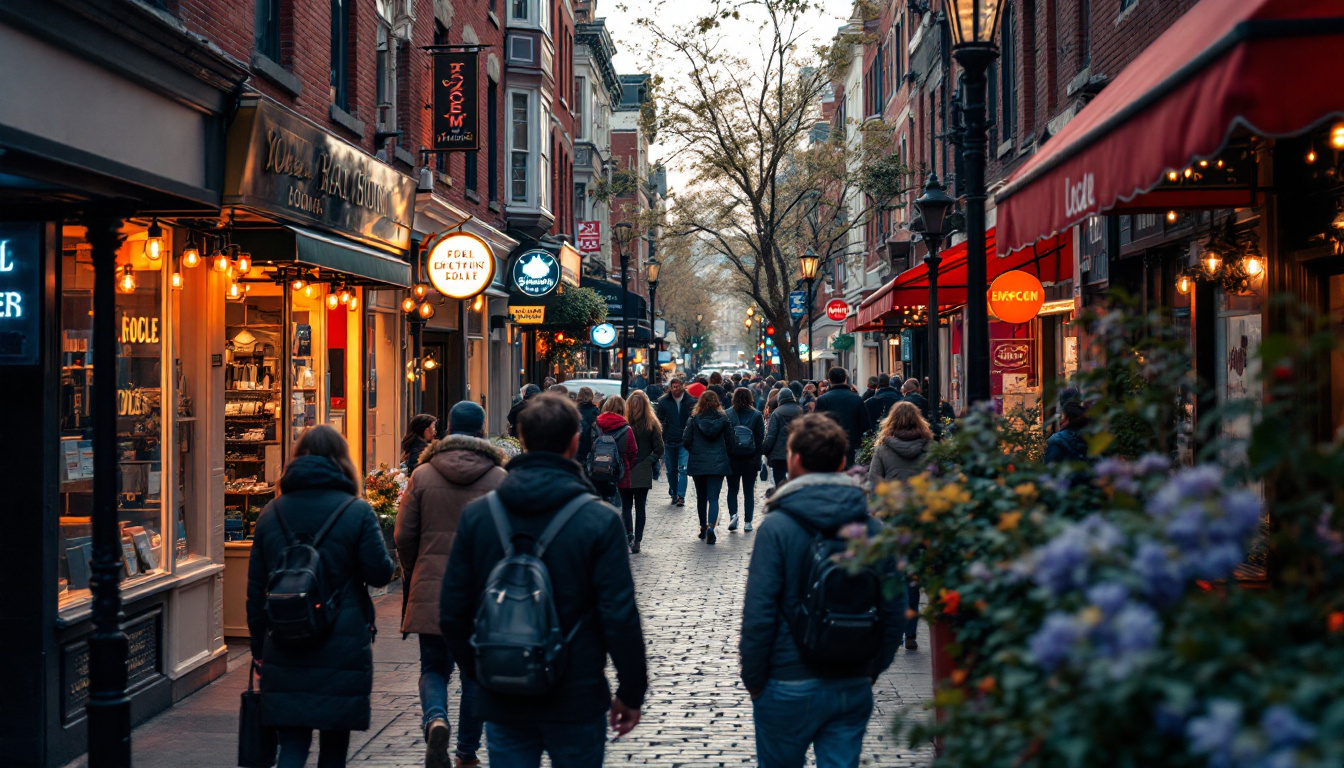How to Measure Success in PPC for Washington, DC Businesses

Pay-per-click (PPC) advertising has become an essential tool for businesses in Washington, DC, looking to enhance their online visibility and drive targeted traffic. With the digital landscape evolving rapidly, it’s crucial to track and measure the success of PPC campaigns effectively. This article breaks down the necessary strategies and metrics to assess PPC performance specifically for businesses operating in the heart of the nation's capital.
Key metrics to track in your PPC campaigns
When managing PPC campaigns, understanding which metrics to track is vital to gauge success accurately. The following metrics are significant for any business's PPC strategy:
- Click-Through Rate (CTR): This indicates how often people click on your ad after seeing it. A high CTR usually signals effective ad copy and targeting.
- Conversion Rate: This is the percentage of users who take a desired action after clicking through, such as making a purchase or signing up for a newsletter.
- Cost Per Click (CPC): Understanding how much you pay for each click helps gauge the overall expenditure and effectiveness of your campaigns.
- Quality Score: This metric affects ad placement and cost. It’s based on the relevance of your ad, keywords, and landing page experience.
- Return on Investment (ROI): Ultimately, businesses should calculate the profit generated from the PPC campaign relative to its cost.
By consistently monitoring these metrics, businesses can adjust their strategies for optimal results, maximizing their advertising budget while attracting the right customers. Additionally, it’s important to segment your data by demographics, device types, and geographic locations to identify trends and insights that can further refine your targeting and messaging. This level of granularity allows for a more tailored approach, ensuring that your ads resonate with the intended audience and drive higher engagement.
How to interpret conversion rates and ROI
Interpreting conversion rates is crucial for understanding the effectiveness of a PPC campaign. A high conversion rate usually indicates that your ads are well-targeted and that your landing page resonates with visitors. Conversely, a low conversion rate may suggest issues with your ad relevance, landing page content, or user experience. It is also beneficial to conduct A/B testing on different ad copies and landing pages to pinpoint what elements contribute to higher conversions, allowing for data-driven decisions that can enhance overall performance.
Businesses should aim for conversion rates tailored to their industry benchmarks. For instance, a conversion rate of 2-5% is often considered average in many sectors. However, the ultimate goal should be to benchmark against previous campaigns and strive for continuous improvement. It is also essential to consider the customer journey; understanding how users interact with your brand across various touchpoints can provide deeper insights into where potential drop-offs occur and how to address them effectively.
Return on Investment (ROI) is another fundamental metric in PPC campaigns. To calculate ROI, utilize the formula:
ROI = (Net Profit / Cost of Campaign) x 100
This calculation provides insight into how effectively the PPC investment generates profit. Businesses should not only focus on immediate profits but also consider the long-term value of acquired customers, as repeat customers can significantly boost ROI over time. Furthermore, analyzing customer lifetime value (CLV) alongside ROI can help businesses understand the broader impact of their PPC efforts, allowing for informed decisions on budget allocation and campaign scaling. By integrating these metrics into a comprehensive performance analysis, businesses can foster sustainable growth and adapt their strategies to meet evolving market demands.
The importance of click-through rates (CTR)
Click-through rates (CTR) serve as an essential indicator of ad performance. A higher CTR implies that your ad is relevant to users, effectively capturing their interest and persuading them to click. This further influences the Quality Score granted by search engines, ultimately lowering costs per click. In the competitive landscape of digital marketing, understanding and optimizing CTR can mean the difference between a successful campaign and one that fails to generate traction.
To improve CTR, businesses should focus on crafting compelling ad copy. Elements such as clear calls to action, unique selling propositions, and ad extensions can significantly enhance click rates. Moreover, A/B testing different ad variations can provide valuable insights into what resonates best with the target audience. By analyzing the performance of various elements, marketers can refine their messaging and better align it with consumer preferences, leading to more effective campaigns.
Strategies to enhance CTR
Here are several strategies that businesses can use to improve their CTR:
- Utilize Targeted Keywords: Ensure that your ads are aligned with the search terms your ideal customers are using. This not only increases visibility but also ensures that your ads appear in relevant contexts.
- Create Eye-Catching Headlines: The headline is the first thing users see. Make it attention-grabbing and relevant. Consider using numbers, questions, or emotional triggers to spark curiosity.
- Highlight Benefits: Focus on what users will gain by clicking your ad—solve their problems or fulfill their needs. This approach helps in establishing a connection with potential customers, making them more likely to engage.
- Implement Ad Extensions: Use site links, callouts, and structured snippets to provide more information and encourage clicks. These extensions not only enhance the ad's visibility but also give users a clearer understanding of what to expect.
Continuous assessment of CTR allows businesses to pivot strategies and create more engaging ads that can lead to higher traffic and conversions. Regularly reviewing performance metrics helps identify trends and patterns in user behavior, enabling marketers to stay ahead of the curve. Additionally, leveraging tools like heat maps can provide insights into user interactions, revealing which elements of the ad capture attention and which may need adjustment. This iterative process fosters a culture of experimentation and learning, essential for long-term success in the ever-evolving digital landscape.
Using analytics tools to measure performance
Leveraging analytics tools is vital for measuring the performance of PPC campaigns effectively. Tools like Google Analytics and Google Ads provide in-depth insights into user behavior, ad performance, and overall effectiveness. By utilizing these tools, marketers can gain a granular understanding of how their ads are performing in real-time, allowing for timely adjustments to maximize ROI.

With analytics, you can track important data such as the source of traffic, bounce rates, and the journey users take after clicking on your ads. Understanding these statistics can help identify strengths and weaknesses in your PPC campaigns. For instance, if a particular ad group is generating high traffic but low conversions, it may indicate a mismatch between the ad messaging and the landing page content, prompting a need for optimization.
Furthermore, integrating Google Analytics with Google Ads can offer a comprehensive view of ad performance, providing valuable data on how converted users interact with your site. This allows businesses to optimize both campaigns and their corresponding web pages for better user experience and higher conversion rates. Additionally, tracking metrics such as average session duration and pages per session can reveal how engaging your content is, which is crucial for retaining visitors and encouraging them to take desired actions.
Recommended analytics practices
Here are practices businesses should adopt when using analytics tools:
- Set Up Goals: Define clear goals in Google Analytics to measure conversions effectively.
- Use UTM Parameters: Tag URLs with UTM parameters to track the effectiveness of individual campaigns, ads, or keywords.
- Analyze User Flow: Understanding how users navigate your site helps identify potential barriers affecting conversions.
- Regular Performance Reviews: Schedule regular reviews of analytics data to uncover trends and insights that require swift action.
In addition to these practices, it is beneficial to segment your audience based on demographics, interests, and behaviors. This segmentation allows for more personalized marketing strategies, as you can tailor your ads to resonate with specific groups. Furthermore, employing A/B testing on different ad copies or landing pages can provide insights into what resonates best with your audience, ultimately leading to improved performance. By consistently refining your approach based on data-driven insights, you can ensure that your PPC campaigns remain competitive and effective in an ever-evolving digital landscape.
Tips for continuous improvement in PPC campaigns
Continuous improvement is essential in receiving optimal results from PPC campaigns. The advertising landscape is dynamic, and staying ahead requires ongoing strategy refinement. Here are some tips for businesses looking to enhance their PPC efforts continually:

- Conduct Regular A/B Testing: Continuously test different ad copies, landing pages, and CTAs to discover what works best.
- Monitor Competitor Strategies: Keeping an eye on competitors' ads can provide insights and inspiration for your campaigns.
- Refine Targeting Options: Reviewing and adjusting targeting settings ensures you reach the most relevant audience.
- Invest in Retargeting: Retargeting ads can help re-engage potential customers who showed interest but didn’t convert.
In conclusion, measuring the success of PPC campaigns involves a multi-faceted approach, focusing on key metrics, user behavior, and continuous optimization. By ensuring clarity in goals and metrics, Washington, DC businesses can harness the full potential of PPC advertising to grow their online presence and drive sales.

As a Google Ads expert, I bring proven expertise in optimizing advertising campaigns to maximize ROI.
I specialize in sharing advanced strategies and targeted tips to refine Google Ads campaign management.
Committed to staying ahead of the latest trends and algorithms, I ensure that my clients receive cutting-edge solutions.
My passion for digital marketing and my ability to interpret data for strategic insights enable me to offer high-level consulting that aims to exceed expectations.









